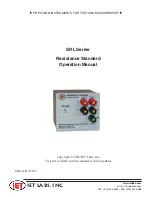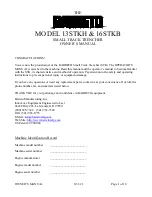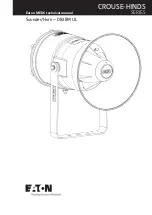
EN
DURO
®
EM303A
+
36
Ref: EM303A
+
-UM-TKI-0116-Rev.A.
Blue LED is blinking (2 times blinking, break, 2 times blinking, break etc.): Battery voltage too low (<10V).
Battery needs to be recharged.
Blue LED is blinking (4 times blinking, break, 4 times blinking, break etc.): Battery Voltage too high (over
charged). Try to discharge the battery by turning on a user (for example a lamp or water-pump).
Red LED (Fig. 3D) is blinking (6 times blinking, break, 6 times blinking, break etc.): Amp overload protection is
activated. Wait about 60 seconds and try again.
In general all error messages will reset automatically after one minute. If this is not the case, reset the
electronics of the manoeuvring system by switching off the system via the isolation switch and the remote
control handset for at least 15 seconds and then turning it on again.
The Reset Button (Fig. 3A): The remote control handset and the control unit are synchronised with each other
in the factory. If the control unit or the remote control handset is replaced, they must be re-synchronised as
described below:
Check the installation in accordance with the installation instructions and ensure that the drive rollers are
not applied. Check that the battery is properly connected, check the condition of the battery and that a
voltage of 12 V is present at the control unit.
Please ensure that the battery isolation switch is on.
Activate the remote control handset by sliding the slide switch to “On”-I (Fig. 5A). The green LED on the
remote control handset (Fig. 5H) starts to flash slowly.
Press the reset button (Fig. 3A) on the control unit. All three LED’s on the control unit (Fig. 3B, 3C & 3D)
will flash slowly.
Press both forwards (Fig. 5B) and reverse (Fig. 5C) button on the remote control handset for about 3
seconds. Then the handset buzzer will give a short beep to confirm that the synchronisation is complete.
After successful synchronisation, the green LED on the control unit (Fig. 3B) and on the remote control
handset (Fig. 5H) will illuminate continuously.
The single-twin axle function switch (Fig. 3S/T): The EN
DURO
®
EM303A
+
caravan manoeuvring system is
suitable for both single axle and twin axle caravans. You just need to pull the single-twin axle function switch
(Fig 3S/T) on the control unit, so that the manoeuvring system can be used for a single-axle caravan or a twin-
axle caravan (for 2 motor use but also for 4 motor use). In the twin axle function the all wheels will drive but at
a different speed.
The switch standard pre-selected for single axle use (Fig 3S). For twin axle use, just move the switch to the
twin axle position (Fig. 3T). When move the single-twin axle function switch, the battery power isolation switch
(29) must be turned off.
OPERATION – GETTING STARTED
Please make sure you read the safety instructions very carefully and make sure that you
follow these guidelines!
Make sure that the battery that supplies the system is fully charged and in good condition.
Make sure that the caravan is free from the vehicle and the handbrake is on. Also make sure
that the corner steady feet are fully raised.
Turn on the battery power isolation switch (29).
Activate the manoeuvring system by move slide switch to “On”-I on the remote control (Fig. 5A). The green
LED (Fig. 5H) on the remote control handset will illuminate and you will hear a short beep. The remote control
is ready for use.
Press at the same time, during at least three seconds, the two buttons for engaging the motor powered rollers
(Fig. 5I). The blue LED (Fig. 5H) will blink fast during these three seconds and every second there will be a
beep. This warns you that the system will be activated!
After these three seconds the motor powered rollers will be pressed against the tyre and the blue LED will
illuminate constant. Now you can release the two buttons. When the motor powered rollers are pressed on the
tyre strongly enough, the blue LED will switch off and is the system ready to manoeuvre. The colour of the
traction indicator label (Fig. 11A) should be into the green area.
Before operating the manoeuvring system, release the handbrake.
Now you can choose the movements according the symbols shown on the remote control. Straight forward (Fig.
5B), straight reverse (Fig. 5C), left forward (Fig. 5D), left reverse (Fig. 5F), right forward (Fig. 5E), right
reverse (Fig. 5G).
















































